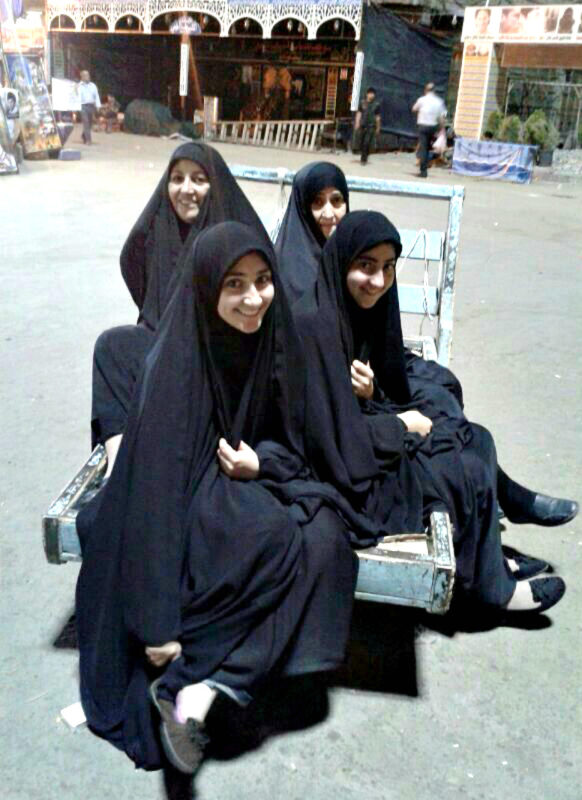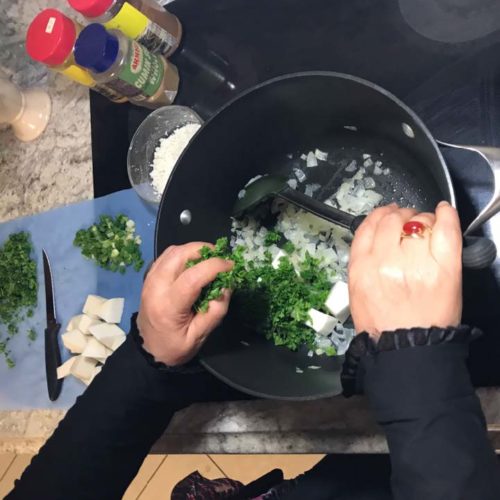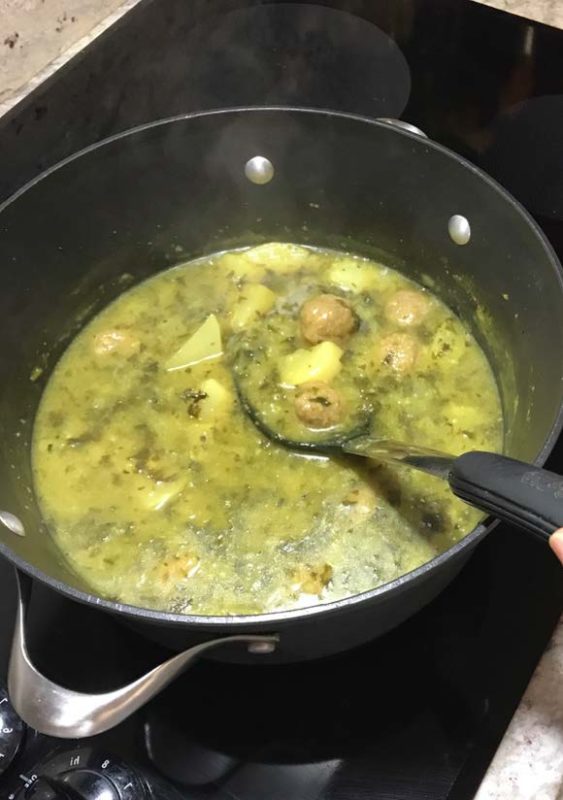I started to ask myself, “What are the youth’s concerns? Struggles? How can my experience offer any assistance?” During the summers, I gathered the neighboring young girls, ages nine to 14, in my mother’s van and set to meet the rest at our masjid.
Workshops would be assembled to strengthen the articulation of their thoughts and to navigate through all the voices that shout at them in their daily lives. I taught them the skills that I craved as a young girl: what to answer when people asked insensitively why I believe and dress the way I do, how to stand up against bigotry, and to lead an active life in one’s society. We read articles online, watched movies, played games… and by the end of the summer, we baked in the kitchen of our Masjid and sold our sweets to raise money for the New Orleans Women’s Battered Shelter. The community began to liven. Discourse was exchanged.

Farah (front) in Iraq in 2013.
There is always something that gathers us on occasions, like Eid, and other occasions. During Ramadan, we fast together. It’s an amazing experience. We cook mostly in Ramadan when people are fasting and we are making their ftoor (dinner after breaking one’s fast). The more you work, the more blessings and rewards you gain. This is a part of our religion; the Ahlulbayt, may peace and blessings be upon them, taught us this. You have to help and serve others. They are the ones that taught us and these are the things we need to teach our children. Do for others; teach others: teach them Arabic, Quran, and teach children religion. The more tiring it is, the more rewards you gain.
Ramadan here is hot; we are fasting and the one who fasts cannot eat or drink and we cook large amounts of food. The food cannot be prepared in the house sometimes because of the heat, and the equipment is too big for our kitchens. So we work outside of the house. Imagine how hot it is in the summer. I wait after Dhuhr when the sun goes a bit down. The work outside with fire, heat, and thirst is extremely hard. But still, we say no matter how much we are struggling, the more the reward there is for us in the end. And why do we do it? To break the fast of those who are fasting. Some of them don’t have a family or they work so they don’t know where to eat. So we invite them to break their fast with food that is delicious and halal. And it comes right on time- the time of iftar.
Some of them don’t need this service, they aren’t poor and can make their own food, but we do this so that everyone can come together to pray and eat and read Quran. This is very good for the community to be in a gathering environment. Gatherings are both religious and social since they are in the summer and the students have holiday. And those who are working come with their families to relax. The atmosphere is nice and the food is good and the donations for the poor begin to start.
Most of the ladies here don’t work outside their homes. In Iraq, even the women that worked would try to balance her life so that she could do everything. It is known that the Iraqi woman can do everything: the food, clothes, cleaning, there are some things that men do but the women do most of the housework. When the families came, the women didn’t work; only a few would go out and work an outside job. We picked up a lot of the housework so that the men can work long hours outside. When we created the community center, the same responsibilities we have at home got transferred over there on us. The men also work; they prepare the programs and speakers. But most of the women work on other things, which is to clean the place, to serve the food, and to maintain the center. There are other Iraqi immigrant communities that handled the roles differently. But in this small community, the women got the food cooked, tea and sweets prepared, distributed, and out on time.
I prepare some things when people ask me; I make their favorites. They await it. It’s not a hard recipe — Qeema. You chop meat in cubes in half inches. The meat is without the bones and needs to be cooked and prepared. Sometimes if it’s for a large quantity I need to buy it ahead of time for three days and cook and freeze it, or I just cut it fresh and cook it the next day.
With it is the chana daal, or leppa in Arabic. Onions are necessary and tomato paste. And the spices are important. Curcumin and curry are used in almost every dish and this one too. We put in cardamom, saffron and cinnamon.
The combination of all of these are about the same amount and you put the fragrant spices in the end so that the smell doesn’t go away or blend with the others. All of these spices together give the best fragrance and taste. And of course, we use salt and lemon and pepper. This is eaten with rice but I don’t cook the rice. The rice is tiresome and it needs a lot of supervision and care. The pot can’t be too hot, and the water can’t be too much. The fire needs to be set perfectly. This dish alone is enough on one person if they want to get it perfectly. And the others do other things.

Ikbal showing Farah how to cook her famous greens and turnip soup and adding her prized meatballs. Photographs by Farah Alkhafaf.

In Ramadan, I like to make my own soup as well. I crush rice to a point that it isn’t noticeable after cooking. Add onions and green veggies: parsley, cilantro, green onions, and a bit of spinach. I wash and chop all of them the day before and save it in the fridge for the next day. We use turnip with this recipe and cut it into small pieces and cook it with the rice. Curcumin and curry is added and you fry everything and then add the kufta, which is like a small meatball. It is my special meatball. No one else does it like me! I soak rice and add a bit of onions, parsley and minced meat. When I mix it together into small balls, I add them into the soup and they don’t break. The quantity of the rice is the factor that holds it together with the meat. When I make it, everyone loves it and only I do this recipe. This is mine.
It is more common to serve in this style in communities outside of Iraq. In Iraq, they are already living in the atmosphere we build in the community centers. It’s in the streets and the family, the neighbors. In the Islamic countries during Ramadan, everyone is fasting and even those who are not fasting, aren’t showing it because that is the rule in Islam. Restaurants are closed in the day and no one eats in the streets. Those who are living there, even if they are not fasting they are living in their environment. They eat at home or on the side and don’t show they aren’t fasting. Over here it’s the opposite. Everyone walks and eats. So how are we supposed to show our kids we are different? And this is something we love, the fasting. In Iraq, it wasn’t that we didn’t serve others, but it would be for our family and neighbors and close friends. We welcome them to our house for dinner. We prepare the ftoor and welcome them and they invite us, too.
 New Orleans Startups
A brief overview of the growing New Orleans startup scene. This piece highlights the main industries of New Orleans, competing cities, and just how emerging the current entrepreneurial/startup scene is in New Orleans.
New Orleans Startups
A brief overview of the growing New Orleans startup scene. This piece highlights the main industries of New Orleans, competing cities, and just how emerging the current entrepreneurial/startup scene is in New Orleans.
 A Bin in Every Classroom: Why Tulane Should Lead on Composting
I asked a peer, Isabel, for her thoughts on composting: “Why do...
Tulane
A Bin in Every Classroom: Why Tulane Should Lead on Composting
I asked a peer, Isabel, for her thoughts on composting: “Why do...
Tulane